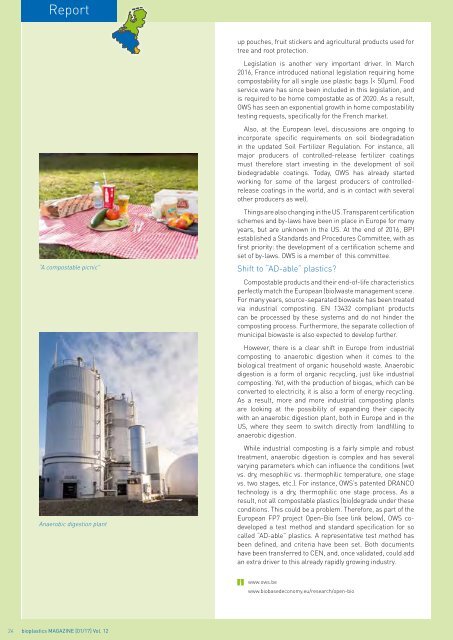Issue 01/2017
bioplasticsMAGAZINE_1701
bioplasticsMAGAZINE_1701
You also want an ePaper? Increase the reach of your titles
YUMPU automatically turns print PDFs into web optimized ePapers that Google loves.
Report<br />
up pouches, fruit stickers and agricultural products used for<br />
tree and root protection.<br />
Legislation is another very important driver. In March<br />
2<strong>01</strong>6, France introduced national legislation requiring home<br />
compostability for all single use plastic bags (< 50µm). Food<br />
service ware has since been included in this legislation, and<br />
is required to be home compostable as of 2020. As a result,<br />
OWS has seen an exponential growth in home compostability<br />
testing requests, specifically for the French market.<br />
Also, at the European level, discussions are ongoing to<br />
incorporate specific requirements on soil biodegradation<br />
in the updated Soil Fertilizer Regulation. For instance, all<br />
major producers of controlled-release fertilizer coatings<br />
must therefore start investing in the development of soil<br />
biodegradable coatings. Today, OWS has already started<br />
working for some of the largest producers of controlledrelease<br />
coatings in the world, and is in contact with several<br />
other producers as well.<br />
“A compostable picnic”<br />
Anaerobic digestion plant<br />
Things are also changing in the US. Transparent certification<br />
schemes and by-laws have been in place in Europe for many<br />
years, but are unknown in the US. At the end of 2<strong>01</strong>6, BPI<br />
established a Standards and Procedures Committee, with as<br />
first priority: the development of a certification scheme and<br />
set of by-laws. OWS is a member of this committee.<br />
Shift to “AD-able” plastics?<br />
Compostable products and their end-of-life characteristics<br />
perfectly match the European (bio)waste management scene.<br />
For many years, source-separated biowaste has been treated<br />
via industrial composting. EN 13432 compliant products<br />
can be processed by these systems and do not hinder the<br />
composting process. Furthermore, the separate collection of<br />
municipal biowaste is also expected to develop further.<br />
However, there is a clear shift in Europe from industrial<br />
composting to anaerobic digestion when it comes to the<br />
biological treatment of organic household waste. Anaerobic<br />
digestion is a form of organic recycling, just like industrial<br />
composting. Yet, with the production of biogas, which can be<br />
converted to electricity, it is also a form of energy recycling.<br />
As a result, more and more industrial composting plants<br />
are looking at the possibility of expanding their capacity<br />
with an anaerobic digestion plant, both in Europe and in the<br />
US, where they seem to switch directly from landfilling to<br />
anaerobic digestion.<br />
While industrial composting is a fairly simple and robust<br />
treatment, anaerobic digestion is complex and has several<br />
varying parameters which can influence the conditions (wet<br />
vs. dry, mesophilic vs. thermophilic temperature, one stage<br />
vs. two stages, etc.). For instance, OWS’s patented DRANCO<br />
technology is a dry, thermophilic one stage process. As a<br />
result, not all compostable plastics (bio)degrade under these<br />
conditions. This could be a problem. Therefore, as part of the<br />
European FP7 project Open-Bio (see link below), OWS codeveloped<br />
a test method and standard specification for so<br />
called “AD-able” plastics. A representative test method has<br />
been defined, and criteria have been set. Both documents<br />
have been transferred to CEN, and, once validated, could add<br />
an extra driver to this already rapidly growing industry.<br />
www.ows.be<br />
www.biobasedeconomy.eu/research/open-bio<br />
24 bioplastics MAGAZINE [<strong>01</strong>/17] Vol. 12


















